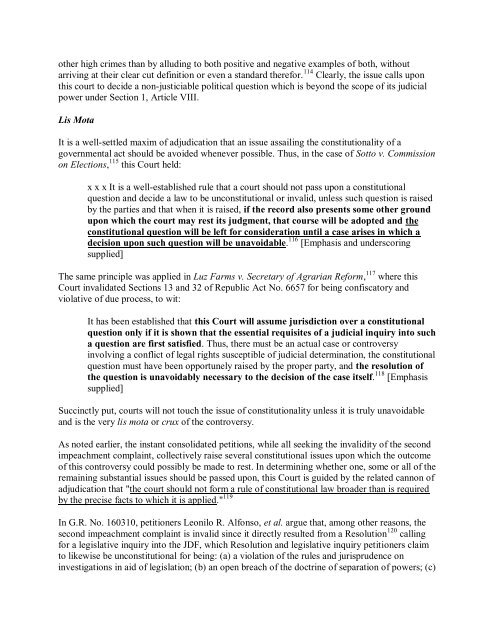Republic of the Philippines SUPREME COURT Manila ... - Columba.us
Republic of the Philippines SUPREME COURT Manila ... - Columba.us
Republic of the Philippines SUPREME COURT Manila ... - Columba.us
Create successful ePaper yourself
Turn your PDF publications into a flip-book with our unique Google optimized e-Paper software.
o<strong>the</strong>r high crimes than by alluding to both positive and negative examples <strong>of</strong> both, without<br />
arriving at <strong>the</strong>ir clear cut definition or even a standard <strong>the</strong>refor. 114 Clearly, <strong>the</strong> issue calls upon<br />
this court to decide a non-j<strong>us</strong>ticiable political question which is beyond <strong>the</strong> scope <strong>of</strong> its judicial<br />
power under Section 1, Article VIII.<br />
Lis Mota<br />
It is a well-settled maxim <strong>of</strong> adjudication that an issue assailing <strong>the</strong> constitutionality <strong>of</strong> a<br />
governmental act should be avoided whenever possible. Th<strong>us</strong>, in <strong>the</strong> case <strong>of</strong> Sotto v. Commission<br />
on Elections, 115 this Court held:<br />
x x x It is a well-established rule that a court should not pass upon a constitutional<br />
question and decide a law to be unconstitutional or invalid, unless such question is raised<br />
by <strong>the</strong> parties and that when it is raised, if <strong>the</strong> record also presents some o<strong>the</strong>r ground<br />
upon which <strong>the</strong> court may rest its judgment, that course will be adopted and <strong>the</strong><br />
constitutional question will be left for consideration until a case arises in which a<br />
decision upon such question will be unavoidable. 116 [Emphasis and underscoring<br />
supplied]<br />
The same principle was applied in Luz Farms v. Secretary <strong>of</strong> Agrarian Reform, 117 where this<br />
Court invalidated Sections 13 and 32 <strong>of</strong> <strong>Republic</strong> Act No. 6657 for being confiscatory and<br />
violative <strong>of</strong> due process, to wit:<br />
It has been established that this Court will assume jurisdiction over a constitutional<br />
question only if it is shown that <strong>the</strong> essential requisites <strong>of</strong> a judicial inquiry into such<br />
a question are first satisfied. Th<strong>us</strong>, <strong>the</strong>re m<strong>us</strong>t be an actual case or controversy<br />
involving a conflict <strong>of</strong> legal rights s<strong>us</strong>ceptible <strong>of</strong> judicial determination, <strong>the</strong> constitutional<br />
question m<strong>us</strong>t have been opportunely raised by <strong>the</strong> proper party, and <strong>the</strong> resolution <strong>of</strong><br />
<strong>the</strong> question is unavoidably necessary to <strong>the</strong> decision <strong>of</strong> <strong>the</strong> case itself. 118 [Emphasis<br />
supplied]<br />
Succinctly put, courts will not touch <strong>the</strong> issue <strong>of</strong> constitutionality unless it is truly unavoidable<br />
and is <strong>the</strong> very lis mota or crux <strong>of</strong> <strong>the</strong> controversy.<br />
As noted earlier, <strong>the</strong> instant consolidated petitions, while all seeking <strong>the</strong> invalidity <strong>of</strong> <strong>the</strong> second<br />
impeachment complaint, collectively raise several constitutional issues upon which <strong>the</strong> outcome<br />
<strong>of</strong> this controversy could possibly be made to rest. In determining whe<strong>the</strong>r one, some or all <strong>of</strong> <strong>the</strong><br />
remaining substantial issues should be passed upon, this Court is guided by <strong>the</strong> related cannon <strong>of</strong><br />
adjudication that "<strong>the</strong> court should not form a rule <strong>of</strong> constitutional law broader than is required<br />
by <strong>the</strong> precise facts to which it is applied." 119<br />
In G.R. No. 160310, petitioners Leonilo R. Alfonso, et al. argue that, among o<strong>the</strong>r reasons, <strong>the</strong><br />
second impeachment complaint is invalid since it directly resulted from a Resolution 120 calling<br />
for a legislative inquiry into <strong>the</strong> JDF, which Resolution and legislative inquiry petitioners claim<br />
to likewise be unconstitutional for being: (a) a violation <strong>of</strong> <strong>the</strong> rules and jurisprudence on<br />
investigations in aid <strong>of</strong> legislation; (b) an open breach <strong>of</strong> <strong>the</strong> doctrine <strong>of</strong> separation <strong>of</strong> powers; (c)


